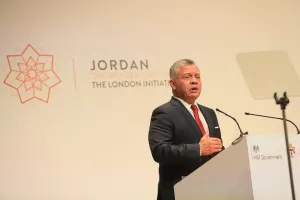There’s a whiff of political reform in the Middle Eastern Kingdom of Jordan. Perhaps.
Ever since gaining independence from the British Empire in 1946, Jordan has been a monarchy. The current king, Abdullah II, has sweeping powers, including the ability to appoint the nation’s cabinet and the entire upper chamber of the legislature.
But over the course of the past week, the Jordanian parliament has approved a slew of constitutional amendments that—ostensibly—could move the country towards democracy. In the face of widespread public dissatisfaction with economic struggles and a lack of meaningful political participation, last June Abdullah convened a “Royal Committee to Modernize the Political System,” the name itself a hint that any reforms toward democracy would be severely limited.
Upon completion of its work late last year, the Committee suggested a series of amendments to the Jordanian parliament. Most were passed by parliament during its recent flurry of lawmaking. The stated goal is to set the country on a path towards more robust political parties and the eventual appointment of the Prime Minister by parliament rather than by the king.
But it’s not so easy to find a clear link between how these new amendments are described by the Committee and what they actually do. It’s true that there’s an electoral law that makes the formation and maintenance of parties somewhat easier. But it’s counterbalanced by laws that endow the king with sole appointment power for key offices and place him at the head of a new national security council outside parliament’s authority.
In response, some members of Jordanian civil society have said that the reforms are actually pushing the country further from democracy, not closer to it. Abdullah is concentrating power rather than relinquishing it to Parliament or new political parties.
Jordan’s political record suggests that this criticism might be right. In 2016, another set of reforms advertised as progress toward democracy or constitutional monarchy actually increased the power of the monarchy relative to parliament. As it turns out, Jordan seems to undergo periods of “reform” every few years. While some reforms may be more positive than others, they rarely last long before the return of the monarchical status quo, suggesting that Jordanian activists’ frustration is well placed.
At the same time, among Middle Eastern monarchies—like Saudi Arabia, Bahrain, the United Arab Emirates, and others—Jordan has one of the most open political systems. What passes for rule of law there is stronger than elsewhere, and mass mobilization by the same frustrated activists is far more likely to bring about change in the long run.
There’s a long history of ruling elites around the world responding to discontent with tactical concessions that pave the road, accidentally, to democracy. In 1832, the government of Britain passed an electoral reform law that it saw as a minor concession to popular discontent. But the British elite could not withhold meaningful participation forever, and in the following decades the franchise expanded. Jordan’s most recent reforms might be toothless or worse, but the very fact that the monarchy feels pressure from a rightfully angry populace might be a sign of more serious reform in Jordan’s future.
Subscribe to Spectacles

Comments
Join the conversation